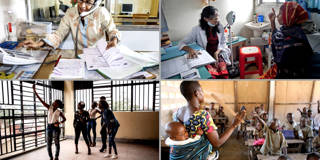For human-development specialists, increasing women's participation in the global economy is essential not only for gender parity, but also for overall income growth. But despite decades of coordinated effort, progress has stalled; PS editors examine why.
For human-development specialists, increasing women’s participation in the global economy is the key not only to gender equality, but also to overall income growth. When women work outside the home, they are less likely to marry young or suffer abuse, and women generally invest more in their family’s future than men do. According to the McKinsey Global Institute, fully empowering women would add some $12 trillion to global GDP by 2025. But despite decades of international effort,the world has so far failed to close the economic gender gap. We already have a roadmap for achieving full financial inclusion; the challenge is to follow it.

For human-development specialists, increasing women’s participation in the global economy is the key not only to gender equality, but also to overall income growth. When women work outside the home, they are less likely to marry young or suffer abuse, and women generally invest more in their family’s future than men do. According to the McKinsey Global Institute, fully empowering women would add some $12 trillion to global GDP by 2025. But despite decades of international effort,the world has so far failed to close the economic gender gap. We already have a roadmap for achieving full financial inclusion; the challenge is to follow it.